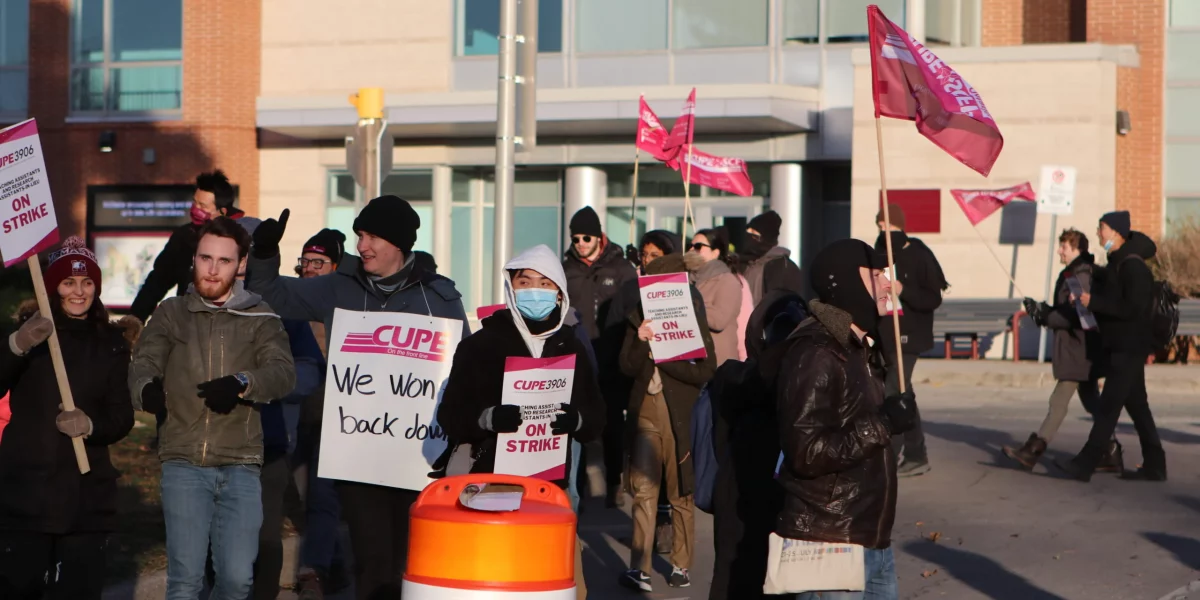December is coming to an end, and for many studying or working in a post-secondary institution, this means that the semester is finally drawing to a close.
As the stress of exams loosens its grip on students and teaching staff at post-secondary institutions, lessons to be drawn from this semester are becoming clear. Coming out of a pandemic, there have been unique challenges to those pursuing a post secondary education. The hardships students face are only exacerbated by the chronic underpaying of academic and service staff at universities.
Ontario is ending the semester on the tail end of two university strikes. One was led by service workers at the University of Toronto and one led by teaching and research assistants at McMaster university. Both groups mentioned wages as one of the sticking points during negotiations.
In Nova Scotia, the Dalhousie Faculty Association (DFA) members, such as professors and instructors, voted 92 per cent in favour of a strike. The DFA wrote in their news release that the wage increase proposed was a major reason they were unhappy with the Board’s offers.
Nova Scotia faculty salaries lagging behind administration salaries
The Association of Nova Scotia University Teachers (ANSUT) released a report in October 2022. The title, “Culture of Entitlement” describes the attitude festering among administration and blocking wages from keeping pace with inflation.
The report explains that spending on executive positions rose 84 per cent between 2011 and 2021. As well, spending on presidents’ salaries rose 41 per cent, spending on vice-presidents’ salaries rose 76 per cent and spending on deans rose 86 per cent. Moreover, spending on directors rose 88 per cent and spending for managers increased by 63 per cent over ten years. Other executive positions, such as executive secretaries, university librarians, university counsel, and registrars saw university increase spending on them by 119 per cent.
Meanwhile, full-time faculty saw wage increases of only 17.5 per cent.
“Cuts made necessary by decreased tuition revenue during the pandemic have been borne
largely by faculty and staff, some of whom were expected to waive cost-of-living increases, accept wage rollbacks or freezes, and teach extra sessions for no compensation,” ANSUT wrote in their report.
Teaching staff who are categorized as instructors or who work on contract are feeling the pinch acutely. David Westwood, president of the DFA, said that they have long been pushing for instructors categorized under the “Instructing Stream” be “elevated” to have their job be categorized as “Professor (Teaching).” Westwood said this elevation would need to include wage increases for instructors to close the gap between professors and instructors.
Universities overly reliant on contract work
Universities are growing more and more reliant on contract work to fulfill faculty tasks. The Canadian Union of Public Employees (CUPE) wrote in the post-secondary sector profile that 54 per cent of faculty work is contract, not permanent.
This growing reliance on contract or part-time faculty is affecting the learning conditions of students as teaching staff is becoming more and more overworked and burnt out.
“Everything’s way more work,” Westwood said. “For instructors, it’s more pressing because you’re doing nothing but teaching. You’re always having to deal with students. In research as a professor, your research is a little bit more under your control.”
Westwood said that in bargaining, the DFA is not always getting reasons for why the university is offering small wage increases and looking for ways to shirk responsibility when it comes to compensating teaching staff.
“My suspicion is they were thinking about money. They know equal status would mean equal pay. Given that these folks are noy well paid, they saw it as a budget issue,” Westwood said. “I don’t want to put words in anybody’s mouth, but that was always our sense of the situation.”
Budget concerns arise when lowest paid faculty and staff ask for wage increases but ANSUT has reported that executive positions in Nova Scotia university have seen skyrocketing compensation.
Universities across Canada see compensation disparity
This pattern can be seen in other universities as well. Allan James, president of the local representing service workers, told rabble in a past interview that while they were bargaining for University of Toronto service workers, the union often heard concerns about fiscal responsibility. The university’s top 10 earners make a total of just over $3.7 million in 2021 according to the Ontario sunshine list.
At the University of McMaster University, where TAs and RAs recently came back from a strike, the top ten earners make a total of over $4.4 million.
While the disparity is clear in Ontario, where university workers recently came back from a strike, and in Nova Scotia where ANSUT has published data on the disparity, there seems to be an issue at universities in other provinces as well.
According to the British Columbia sunshine list, six staffers at the University of British Columbia made a total of $2.4 million while sessional instructors make about $23,900 for teaching 15 credits in a semester.
Westwood said that from his perspective in Nova Scotia, universities need to reexamine where they prioritize funding.
“During COVID, nobody was using buildings on campus. Everybody was living at home and teaching from home. Yet, magically, universities continued despite not having a single building being used to teach people,” Westwood said. “That, to us really, reinforced the idea that the university is people. The money should be going to them. COVID taught us it’s always people first. Why boards of governors can’t see that? I don’t know.”
Editor’s Note: A previous version of this article used the phrase “coming out of the pandemic” which inaccurately gives the impression that the COVID-19 pandemic is over. Many people continue to suffer infection, complications and death. The phrasing has been corrected to recognize the ongoing suffering caused by COVID-19 and acknowledge our ongoing need to keep each other safe.




